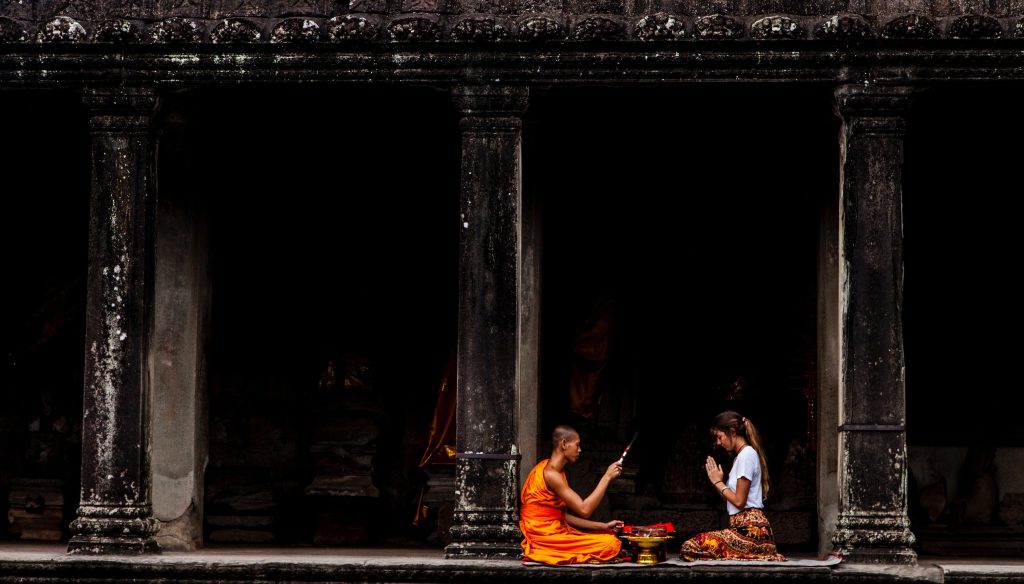Five things that block the pure state of meditation
(Rise Earth) What is preventing you from connecting with the Divine?
Pure state of meditation
Spiritual teachers say we have a divinity within us that surpasses human conditioning. It has been called by many names. In Buddhism, it’s known as Buddha Nature: an empty luminous awareness which is ever present at the very heart of all moments and the ground of all experiences. In Hinduism, it’s been known for thousands of years as Brahman, the universal consciousness which is the source of all things and the essence of being.
The naturally joyful light of awareness is always shining. It merely gets covered over by repeatedly grasping at thoughts and chasing after instinctual and socially constructed desires. Nirvana is the elimination of that never-ending cycle of pursuing happiness in outer conditions and the name given to the intense peace experienced after the extinguishing of that fruitless project.
The pure state of meditation is beyond time because it is eternally present. Discovering and realising this ‘hidden in plain sight’ natural treasure is the purpose of meditation. Zen master Dogen advises to sit with the confidence that you are already Buddha, Tibetan yogis suggest to just sit and not change or fabricate anything and the highest non-dual teachings of Indian Advaita tell us you simply have to stop seeking anything else and realise you already are what you’re searching for.
The natural radiance of our essentially divine nature is love, bliss and wisdom. As experienced by so many mystics throughout the ages and even found by everyday people who have come to a cathartic enlightened experience in various ways; including near-death experiences, complete surrender, moments of awe fully connected with the majesty of nature or any experience which directs attention completely and undisturbed deeply into the present moment.
Meditation is nothing but a device to make you aware of your real self—which is not created by you, which need not be created by you, which you already are. You are born with it. You are it!
Ok, I’ve mentioned this is the pure state of meditation, not mindfulness, not concentration and not energy manipulation. All those things are great but they are not pure meditation which is beyond all fabricated or manipulated temporary states of mind. In Vedic terms, people are often directed to look for what is permanent, which is a great way of finding the ultimate pure nature within. I don’t mean to be dogmatic or arrogant about meditation by saying what it really is, I just want to point out what I have found to be the highest ultimate meditation and separate it from the many different types of relative meditation practices out there.
The pure state of meditation is simply abiding as that which you already are, without any attempt to look elsewhere or manufacture any specific states of mind. This mind as it is right now is enlightenment. Even though it’s available and waiting for you to discover, not everyone can find it and there are five main things that get in the way and cover your radiant true nature, therefore preventing you from experiencing it. I also included simple instructions at the end of each section to help experience the pure state of meditation.
5 Things that stop people experiencing the pure state of meditation
1. Too much concentration
Too much concentration restricts and narrows the mind onto an object and can temporarily bring states of bliss and relief, but this level of concentration can never be maintained. Concentration is useful as a doorway into the natural state but it’s a poor substitute. Too much one pointed concentration leads into a trance-like state which again is pleasant but not what we’re looking for.
Effortless doesn’t mean no concentration; effortless means just enough concentration to be vivid, to be present, to be here, to be now. To be bright. My teacher used to call this ‘effortless concentration.’ We each need to find out for ourselves what this means. Too much concentration and we get too tight; too little concentration and we get dreamy. Somewhere in the middle is a state of vividness and clarity and inner brightness.
Too much concentration takes too much effort; too much force leads you away from the natural state of being. Not enough concentration and you will become dull and fall asleep. The pure state of meditation is effortless and natural so trying to concentrate too much and relying on concentration can inhibit and block this natural state of being.
In true meditation, all objects (thoughts, feelings, emotions, memories, etc.) are left to their natural functioning. This means that no effort should be made to focus on, manipulate, control, or suppress any object of awareness. – Adyashanti
Instruction: Not too tight, not too loose; without anything to concentrate on you are nevertheless undistracted.
2. Goals and expectations
This is a major stumbling block for many people which prevents the pure state of meditation. Just like sleep restores the body and mind, meditation has many scientifically proven health benefits which stem from the deep rest and stress-free states that arise within a naturally pure meditation. However, to sit with these goals in mind strangely stops you from achieving them.
The pure state of meditation cannot be created through causes or is ever an effect of a technique. It’s more like you set up the right conditions and remove all the obstacle, like the ones I’m pointing out in this article, and then meditation arises by itself, you cannot force it or will it to happen. As explained by the great Tibetan Buddhist master Dilgo Khentse Rinpoche:
We should realise that meditation transcends effort, practice, aims, goals and the duality of liberation and non-liberation. Meditation is always perfect; there is no need to correct anything.
The pure state of meditation is goalless because pure meditation is timeless. Some call it transcendent, going beyond the normal realms of cause and effect into a pure realm of eternal nowness. Others call it spontaneous presence. Just resting into your true nature allows this primordial presence to shine. But it’s not a meditation technique that causes the effect of pure presence, real meditation is not a technique that causes a result.
When you sit in a pure state of meditation there is nothing left to add and nothing to take away. Timelessly perfect as an embodiment of the entire universe.
Many people I have coached in meditation have had amazing mystical experiences in the past and this can become a major obstacle to ongoing meditation because these people have huge expectations of their meditation to bring about these mystic experiences again. But no matter what amazing experiences you’ve had in the past, the resounding advice from all meditation masters is to let them go too and just rest in your natural state.
Also, it’s important to take time out of the equation when sitting in meditation.
Instruction: Do not look to the future, do not dwell on the past and do not expect anything in the present moment. Just sit in the clarity of the here and now.
3. Being overly controlling
This is such an important blockage to dissolve because it is at the heart of an egoic mode of being as opposed to an authentic way of being. An ego is always trying to control and manipulate situations for its perceived benefit. But pure meditation arises due to genuine authenticity. A fierce determination to be yourself, warts and all.
A naturally pure meditation is not about controlling your breath or your body’s energy or even trying to control your thoughts, it’s releasing your hands off the wheel and taking a mental step backwards and allowing things to be as they are.
Real meditation is not about mastering a technique; it’s about letting go of control.
Trying to control your meditation is a sure fire way to ruin your chances of revealing your naturally pure awareness. This can be very frustrating because we are so used to exerting our will power to get what we want but natural meditation is a complete reversal of this process. Put in another way:
…the pure state of meditation is a state of being not a state of doing.
One of the best ways to gauge your ability to not be in control is to use the classic observation of the breath as a gateway to a naturally pure meditation. Because of our conditioned ways of doing things, we always try and control what we observe and it becomes evident when we watch our breath. It’s difficult to let go of breathing intentionally and just watch the breath do whatever it is doing. The Buddha’s advice is: If it’s a short breath, observe a short breath; if it’s a long breath, observe a long breath etc.
Because we can both control our breath and let go of control and just observe the breath it’s an awesome tool for entering into the natural state. Allow your breath to breathe itself, on automatic just like it is for most of the day and night, but calmly notice this automatic process without controlling it in any way. Try it. It’s radically peaceful.
Extend this non-interfering type of witnessing to the entire moment of meditation. Including thoughts. Don’t try to suppress or control thoughts, allow them to arise and they also dissolve into nothingness all by themselves. This is the naturally liberating freedom of just being.
Instruction: Let yourself be as you are; don’t change anything, don’t fabricate anything allow and open yourself into being the silent witness.
4. Pretending
When sitting down to practice real meditation, it’s important not to pretend to be anything other than what you already are. Don’t add anything extra. Don’t clothe your naked awareness with accessories. Especially don’t think that now I am meditating, that’s just more pretending. Pure meditation is just a name given to the natural state of being, don’t adopt it as a new identity that will cover the real state and don’t think it’s something special either.
When engaging in meditation practice, we should feel it to be as natural as eating, breathing and defecating. It should not become a specialized or formal event, bloated with seriousness and solemnity. – Dilgo Khentse Rinpoche
Don’t replace the authentic state of meditation with the knowledge of meditation. The natural state is not a philosophy, it’s a state of being.
Also, don’t fool yourself that being high is meditation. No matter how blissful, insightful or even therapeutic taking different drugs can be it’s a poor substitute for the natural state of being, which is timelessly present and not reliant on any substances.
Pretending can take many forms, including acting spiritual, pretending to love everyone, wearing spiritual clothes and even adopting a new spiritual name. There’s nothing particularly wrong with those things, I’m just warning to not get so caught up in them that you cannot just sit and be your true authentic self as you are.
I’m certainly not claiming to be perfect here, I’m talking about the ability to just sit with yourself as you are. I think a good dose of humour is essential in the pursuit of meditation to not take yourself too seriously. If you haven’t seen JP Spears YouTube clips take a look where he makes fun of being ultra spiritual.
Instruction: When sitting in meditation, completely relax all your face muscles, let go of all pretences and masks and be as simple and authentic as you can be.
5. No trust in your real self
This is the crux of it. If you don’t trust that your essential nature is pure, wise and all fulfiling, it’s difficult to truly let go and just be yourself. As one Zen master advises.
Just be yourself, not the one you imagine yourself to be but your true self before any descriptions.
This lack of trust that you are already complete and fulfilled drives the compulsive chasing of satisfaction in the conditions of life, which can never fully satisfy you completely because life is ephemeral and constantly changing. This lack of trust in the satisfaction of just being is a major hindrance and blockage of being able to rest in a state of pure meditation.
It’s in this trusting of your own nature that real freedom can be found and a natural simplicity of being can easily emerge, as Adyashanti says:
All that is necessary to awaken to yourself as the radiant emptiness of spirit is to stop seeking something more or better or different, and to turn your attention inward to the awake silence that you are.
Of course, this should not stay on the level of blind faith or trusting someone else, once you have directly experienced this naturally abiding peace for yourself it becomes real confidence. Zen master Bankei said:
…Conclusively realise that what’s unborn and marvellously illuminating is truly the Buddha Mind.
It is necessary at the beginning to be inspired and trust the words of others until you have realised it for yourself.
Only those who have the great capacity of genuine trust can enter this realm. Those who have no trust are unable to accept it, however much they hear it. – Zen Master Dogen
Hopefully this article has inspired this type of trust or at least enough curiosity to find it and have a go at experiencing for yourself a naturally pure meditation. Dive headfirst into the empty abyss of just being to reveal what was always there, waiting to be revealed. A luminous natural clarity unstained by ideas or judgements, free from all stress, artifice, the original authentic wakefulness that easily manifests when all effort and control are dropped and there’s nothing left but this moment, just as it is.
Instruction: Trust that your nature is all good and simply rest back, without trying to do anything, and peace, joy and clarity will naturally emerge.
Source: Rise Earth
You may also like:
7 Ways mindfulness unlocks the door to your authentic life




